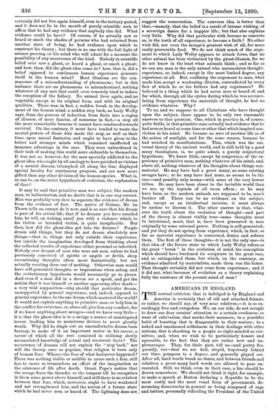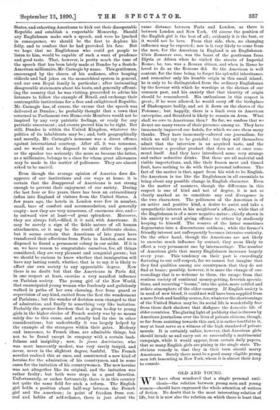AMERICANS IN ENGLAND.
THE mutual criticism that is indulged in by England and America is certainly that of old and attached friends, or rather, we should say, of very near relatives ;—it is so ex- ceedingly free and outspoken. We, on our side, do not scruple to draw our dear cousins' attention to a certain crudeness, or want of cultivation, that marks their manners ; to a youthful habit of boasting that is disagreeable to their seniors ; to a naked and unashamed selfishness in their dealings with other nations, that is shocking to a people so right-minded as our- selves; and, when we wish to be particularly honest and agreeable, to the fact that they are rather new and un- picturesque. They, for their part, tell us—and pretty fre- quently, too—that we are dull, stupid, hopelessly behind our time, pompous to a degree, and generally played out. After all, hard words break no bones, and between friends and relatives a great many bard words are allowed to pass un- resented. Still, we think, even in their case, a line should be drawn somewhere. We should not think it right, for example, to make a speech at Boston declaring a Republic to be the most costly and the most venal form of government, de- nouncing democracies in general as being composed of rags and tatters, personally ridiculing the President of the United
States, and exhorting Americans to kick out their disreputable Republic and establish a respectable Monarchy. Should any Englishman make such a speech, and were he lynched in consequence, we should be the first to deplore his lolly, and to confess that he had provoked his fate. But we hope that no Englishman who could get people to listen to him, would be capable of such a want of prudence and good taste. That, however, is pretty much the tone of the speech that has been lately made at Dundee by a Scotch- American millionaire, Mr. Carnegie by name. This gentleman, -encouraged by the cheers of his audience, after heaping ridicule and bad jokes on the monarchical system in general, and our own Royal family in particular ; after insinuating disagreeable statements about his hosts, and generally affront- ing the country that he was visiting, proceeded to advise his listeners to follow the example of Brazil, and exchange their -contemptible institutions for a free and enlightened Republic. Mr. Carnegie has, of course, the excuse that the speech was -delivered at Dundee ; he probably thought that a town that returned to Parliament two Home-rule Members would not be inspired by any very patriotic feelings, or ready for any patriotic resentment ; and events proved him to be right. But still, Dundee is within the United Kingdom, whatever the politics of its inhabitants may be ; and, both geographically and morally, Mr. Carnegie's nonsense was a direct offence against international courtesy. After all, it was nonsense, -and we would not be disposed to take either the speech or the speaker too seriously; the more so because the latter, as a millionaire, belongs to a class for whom great allowances may be made in the matter of politeness. They are almost asked to be uncivil.
Even though the average opinion of America does dis- approve of our institutions and our ways at home, it is -certain that the disapproval of Americans is not strong -enough to prevent their enjoyment of our society. During the last four or five years, there has been an extraordinary influx into England of visitors from the United States. A few years ago, the hotels in London were few in number, small, bare of comfort and accommodation, and generally -empty : now they are very numerous, of enormous size, and— to outward view at least—of great splendour. Moreover, they are always full,—filled, it it said, with Americans. It -may be merely a sign of the fickle nature of all human _attachments, or it may be the result of deliberate choice, but it seems certain that Americans of late years have transferred their affections from Paris to London, and seem -disposed to found a permanent colony in our midst. If it is so, we have reason to congratulate ourselves, for, all things .considered, they are very pleasant and congenial guests ; but we should be curious to know whether that immigration will have any lasting result, whether, that is to say, it is likely to affect our own society to any appreciable degree. Now there is no doubt but that the Americans in Paris did in one respect at least, exercise a very manifest influence on Parisian society. The young girl of the New World, that emancipated young woman who fearlessly and guilelessly walked in paths of her own choosing, free from guard or _supervision of any kind, excited from the first the wonderment of Parisians ; but the wonder of derision soon changed to that of admiration, and finally to something very like imitation. Probably the greater freedom that is given to-day to young girls in the higher circles of French society was by no means -solely due to this cause, and actually had its rise in other considerations ; but undoubtedly it was largely helped by the example of the strangers within their gates. Modesty and innocence, to French ideas, are admirable things, but not to be found except in company with a certain bash- fulness and insipidity ; now, la jeune Amgricaine, who was most innocently modest, was very rarely insipid, and never, never in the slightest degree, bashful. The French novelist realised this at once, and constructed a new kind of heroine for the admiration of his countrymen, and in some oases for the imitation of his countrywomen. The new heroine was not altogether like its original, and the imitation was rather faulty ; but both were steps in a good direction. -Unfortunately, or rather fortunately, there is in this country not quite the same field for such a reform. The English girl holds a position about half-way between the French girl and the American ; in point of freedom from con- trol and habits of self-reliance, there is just about the same distance between Paris and London, as there is between London and New York. Of course the position of the English girl is the best of all ; evidently it is the best, or it would not be hers. From that side, then, no changing influence may be expected; nor is it very likely to come from the men, for the American in England is an Englishman. Civic Romanus sum, was the boast of the gentleman from Illyria or Africa when he visited the streets of Imperial Rome; he, too, was a Roman citizen, and when in Rome he loved to do as the Romans did. So the American is well content, for the time being, to forget his splendid inheritance, and remember only his humble origin in this small island ; he is only to be distinguished from the ordinary Englishman by the fervour with which he worships at the shrines of our common past, and his anxiety that that identity of origin should be remembered. His enthusiasm in this respect is great ; if he were allowed, he would carry off the birthplace of Shakespeare bodily, and set it down on the shores of the Potomac; bat, happily, there is a limit even to American enterprise, and Stratford is likely to remain on Avon. What shall we owe to Americans, then ? So far,-we confess that we do not see many traces of their presence among us. They have immensely improved our hotels, for which we owe them many thanks. They have immensely—altered our journalism, for which we will try to be grateful ; but they will themselves admit that the interview is an acquired taste, and the interviewer a peculiar product that does not at once com- mend itself. And they have introduced some very strange and rather seductive drinks. But these are all material and visible importations, and, like their frozen meat and tinned fruit, have nothing to do with their personal influence. The fact of the matter is that, apart from his wish to be English, the American is too like the Englishman in all essentials to bring about any possible change in English character. Even in the matter of manners, though the difference in this respect is one of kind and not of degree, it is not so clearly marked as to constitute any real divergence in the two characters. The politeness of the American is of an active and positive kind, a desire to assist and take a sympathetic interest in his neighbour's affairs ; while that of the Englishman is of a more negative nature, chiefly shown in his anxiety to avoid giving offence to others by studiously keeping to himself. The reserve of the latter sometimes degenerates into a discourteous coldness ; while the former's friendly interest not unfrequently becomes intrusive curiosity. On the other hand, though the Americans are not likely to exercise much influence by contact, they seem likely to effect a very permanent one by intermarriage. The number of American girls that marry Englishmen increases largely every year.. This tendency on their part is exceedingly flattering to our self-respect, for we cannot but imagine that they find qualities among our countrymen that they do not find at home ; possibly, however, it is more the change of sur- roundings that is so welcome to them, the escape from that restless society of continual money-getting, feverish specula- tions, and recurring " booms," into the quiet, more settled and sedate atmosphere of the older country. If English society is in need of new blood, it could not well have been supplied from
a more fresh and healthy source, for, whatever the shortcomings of the United States may be, its social life is wonderfully free from those dark shadows that disfigure the domestic life of older countries. The glaring light of publicity that is thrown by American journalism over the lives of private citizens, though, so far from assisting towards this end, it is rather hurtful to it, may at least serve as a witness of the high standard of private morals. It is certainly unfair, however, that American girls should invade us and carry out so successfully a matrimonial campaign, while it would appear, from certain daily papers, that so many English girls are pining in the single state. The obvious remedy is, that they in their turn should marry Americans. Surely there must be a good many eligible young men left lamenting in New York, whom it is almost their duty to console.







































 Previous page
Previous page